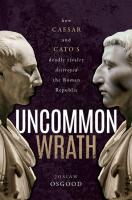
OUP (2022) h/b 352pp £25.00 (ISBN 9780192859563)
Much has been written about the last years of the Roman Republic, but never quite like this. To lead us through the tortured decades from Sulla’s dictatorship to Augustus’ principate, O. focusses on two ‘great men’, whose outlook on life, politics and ethics could not have been more different, whose rivalry helped to destroy them both and whose enmity contributed to the demise of a centuries-old constitution.
In this fast-paced, well-written and authoritative narrative, O. explores the parallel lives of Caesar and Cato, politicians who shared noble backgrounds yet held antithetical views, the one flamboyant, ruthless, driven by a sense of his own destiny and dignitas to unleash Roman legions upon Rome itself, the other an ascetic whose zealous moral rectitude was rooted in the lofty values of a bygone age and whose belief in the inviolability of the Roman constitution was paramount. With such diverse protagonists, it is to O.’s credit that the swashbuckling Caesar with his dazzling political career, his campaigns in Gaul and Britain and his Egyptian dalliance with Cleopatra does not overshadow the dour, bureaucratic Cato, whose tactic of choice was to filibuster in the Senate, the institution which he loved so dearly—though (when pushed) he proved perfectly capable of leading a forced march through the searing desert of North Africa.
Rather, thanks to deft characterisation, O. explores the strengths and weaknesses not just of the two individuals but through them of the values and outlooks which each man embodied and of the society which both inhabited, revealing Rome as a city dangerously divided, where political polarisation proved a fertile seedbed for the aspiring dictator. While O. never belabours the point, modern parallels spring all too easily to mind—and this, together with its clarity and vitality, is one of the many strengths of this splendid study.
With 14 black-and-white photographs, six excellent maps, comprehensive endnotes, an index and a useful note on sources, it is a volume which should grace the shelves of school and university libraries, of value to teachers and students alike, not to mention general readers with an interest in Roman history and politics. For, while revealing a clear path through an often all-too-dense period of history and containing some great set-pieces (the Catilinarian crisis and Cato’s last stand at Utica, to name but two), it raises issues of timeless consequence, not least concerning how to withstand determined autocrats and uphold the constitution in the face of armed insurgents.
In a polarized world, O.’s final words should give us pause: ‘…before civil war, bitter partisanship comes that justifies almost any deed and ravages all trust. We know that the attack is wrong, that somehow it will damage all of us, but it feels so good to strike that we find it hard to stop. And so the chain of disaster really starts.’
David Stuttard
